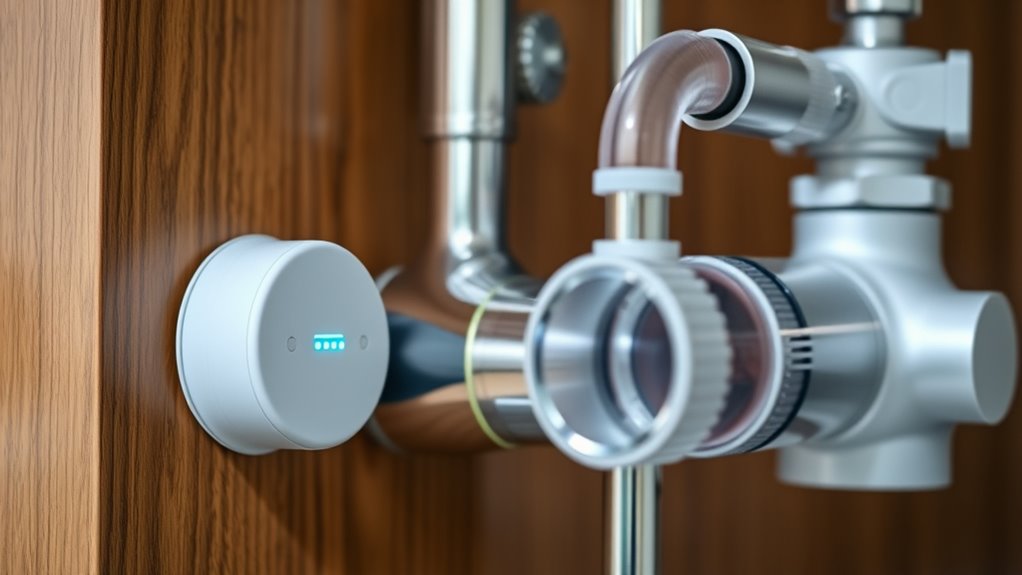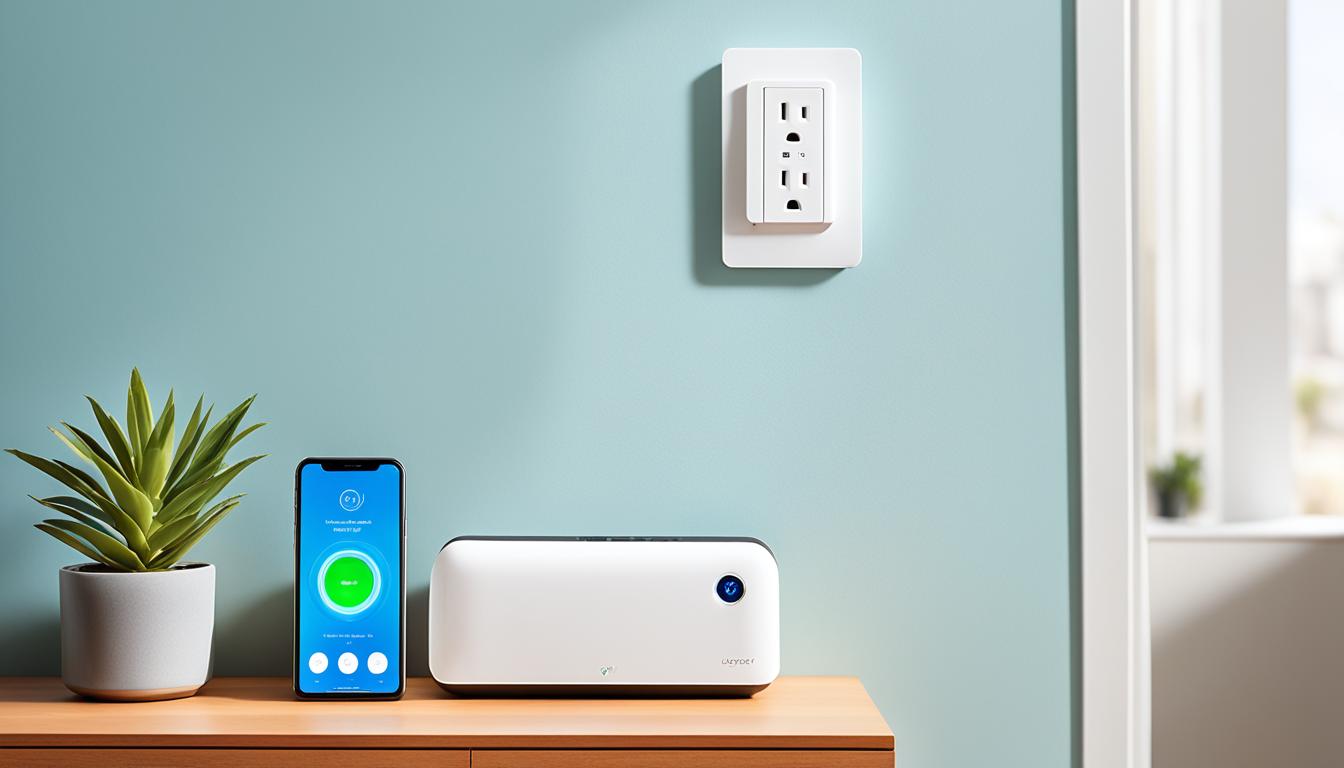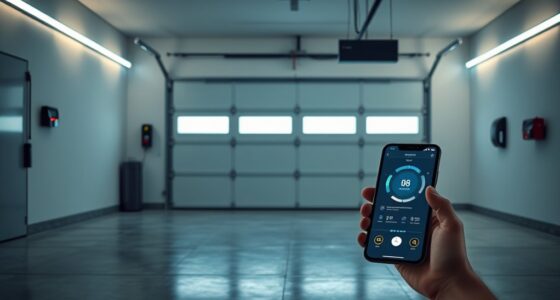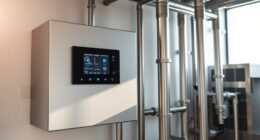Smart water leak detectors and shutoff systems automatically monitor your home’s pipes and appliances to catch leaks early. When a leak is detected, these systems often trigger an auto shutoff to prevent water damage, giving you peace of mind. They can be connected to your Wi-Fi or app for real-time alerts and system control. Keep an eye on installation and maintenance tips to maximize their benefits, and discover how these systems work more closely if you continue exploring.
Key Takeaways
- Integrate smart leak detectors with automatic shutoff systems for immediate water cutoff upon leak detection.
- Position detectors near water appliances, under sinks, and along basement floors for early leak detection.
- Regularly test and maintain sensors to ensure reliable alerts and system functionality.
- Use Wi-Fi or app-enabled systems for remote monitoring and control of leak detection and shutoff.
- Follow manufacturer guidelines for installation and maintenance to maximize system performance and longevity.
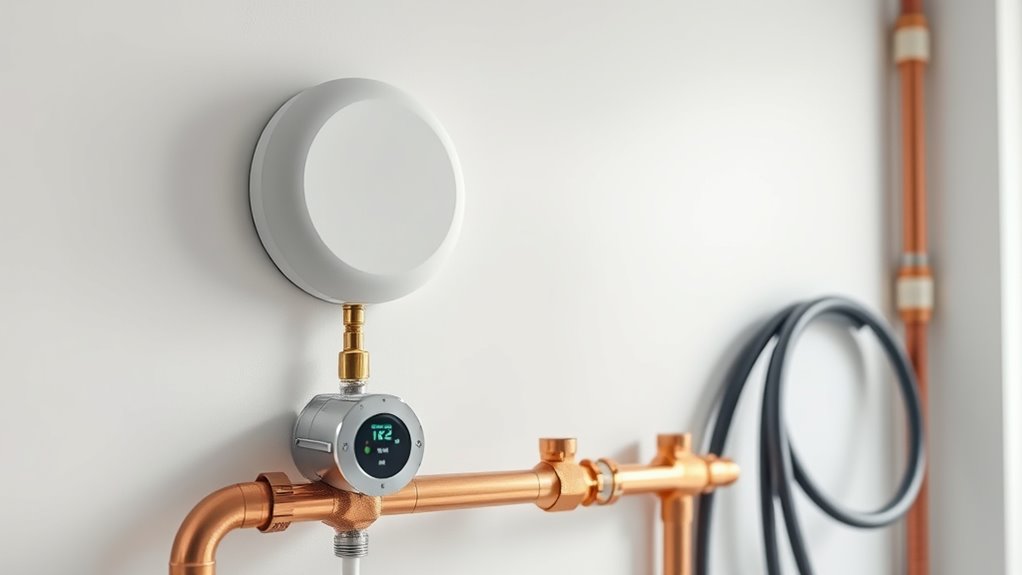
Smart water leak detectors are essential tools for protecting your home from costly water damage. When you install these devices properly, you can catch leaks early and prevent significant damage to your property. To get started, consider the placement of your leak detectors carefully. Place them near appliances that use water, such as dishwashers, washing machines, and under sinks. Also, position detectors close to water heaters and along basement floors where leaks are most likely to occur. Following installation tips ensures your detectors function effectively and alert you promptly when there’s a problem. Make sure the devices are mounted on a flat, stable surface, and keep them away from areas prone to dust or humidity that could interfere with their sensors. Regular maintenance is vital to ensure consistent performance and early leak detection. Device maintenance is equally important to keep your leak detectors working reliably over time. Regularly check the batteries, especially if your devices use replaceable power sources. Many models offer low-battery alerts, but it’s wise to test your detectors monthly by pressing the test button to verify they’re still responsive. Clean the sensors periodically with a soft cloth to remove dust or dirt that could impair detection. If your detector has a water sensor pad, ensure it remains dry and free of debris. Additionally, update the firmware if your system supports software updates, which can enhance performance and security. Proper maintenance not only prolongs the lifespan of your detectors but also guarantees prompt alerts when leaks occur. Integrating smart shutoff systems with your leak detectors adds an extra layer of protection. When a leak is detected, these systems can automatically shut off your water supply, minimizing damage. To maximize effectiveness, familiarize yourself with the installation tips provided by the manufacturer. For instance, some shutoff valves are compatible with specific water lines or require professional installation for ideal performance. Once installed, routinely test your system’s functionality by simulating a leak, ensuring the shutoff activates as intended. Keep an eye on the system’s connectivity if it’s Wi-Fi or app-based, and perform regular updates to keep the system running smoothly. Additionally, understanding the importance of system reliability can help you choose the best setup for your home’s needs.
Frequently Asked Questions
How Do Leak Detectors Differentiate Between Minor and Major Leaks?
You can tell leak severity by how sensitive your detector is set. Higher detection sensitivity picks up even minor leaks, while lower sensitivity focuses on major leaks. Many detectors monitor water flow and moisture levels, adjusting alerts based on leak severity. By customizing detection sensitivity, you guarantee that small leaks don’t go unnoticed, but you’re also alerted promptly to serious leaks, helping prevent water damage effectively.
Can Leak Detectors Operate Effectively in Outdoor or Unheated Areas?
Imagine your garden hose freezing in winter—leak detectors face the same challenge outdoors. They can operate effectively in outdoor or unheated areas if they’re designed with outdoor durability and temperature resilience. Some models withstand harsh weather, ensuring you’re alerted to leaks even in freezing or rainy conditions. Just like a sturdy umbrella shields you from storms, these detectors protect your home from water damage, rain or shine.
Are Smart Leak Detectors Compatible With All Home Automation Systems?
Yes, smart leak detectors are compatible with many home automation systems, but integration challenges can arise. You might face compatibility concerns depending on your system’s brand or protocol. To guarantee smooth operation, check if the leak detector supports your existing platform, like Zigbee or Z-Wave. Sometimes, you may need a hub or bridge to connect different devices seamlessly, so verify compatibility before purchasing.
What Is the Typical Battery Life of Wireless Leak Detectors?
Wireless leak detectors usually have a battery longevity of one to three years, depending on the model and usage. You’ll need to perform regular power maintenance, such as replacing batteries when prompted, to guarantee they stay functional. Keep an eye on the device’s alerts, and consider models with longer-lasting batteries if you want less frequent replacements. Proper power maintenance helps you avoid leaks and potential water damage.
How Do Leak Detectors Alert Users During Power Outages?
During power outages, your leak detectors rely on backup power sources, like batteries or integrated UPS systems, to stay operational. They send alarm notifications through loud sounds or mobile alerts, making sure you’re promptly informed of leaks. This way, you’re always aware of potential water issues, even if the main power is down. Regularly check backup power to guarantee your leak detectors continue providing reliable alerts when you need them most.
Conclusion
By installing smart water leak detectors and shutoff systems, you’re creating a vigilant safety net that catches leaks before they cause chaos. Think of these devices as your home’s silent guardians, quietly watching over your space like a loyal dog alerting you to trouble. With their real-time alerts and automatic shutoff, you can rest easy knowing your home’s foundation is protected, and costly water damage is kept at bay—turning a potential flood into just a ripple in the past.
